Detailed Analysis of the ASIC v Flugge (No 2) [2017] VSC 117 Case
VerifiedAdded on 2021/05/30
|8
|2431
|325
Report
AI Summary
This report offers a comprehensive analysis of the ASIC v Flugge (No 2) [2017] VSC 117 case, which involved claims by ASIC against the director and chairman of AWB for breaching their duties under the Corporations Act 2001, specifically sections 180(1) and 181. The case centers on AWB's payments to Iraq, allegedly in violation of UN sanctions. The report examines the background of the case, the duties and responsibilities breached by the directors, and a critical analysis of the court's decision, including the penalties imposed. Furthermore, it explores the impact of the decision on Australian corporation law, including proposed insolvency reforms and changes to corporate governance rules. The analysis highlights key aspects of the case, such as the court's findings on Mr. Flugge's failure to inquire about the payments and the implications for director responsibilities, particularly the importance of due diligence and the potential risks associated with non-executive chairmen. The report concludes by discussing the changes to the Corporation Act 2001 that have resulted from this case.
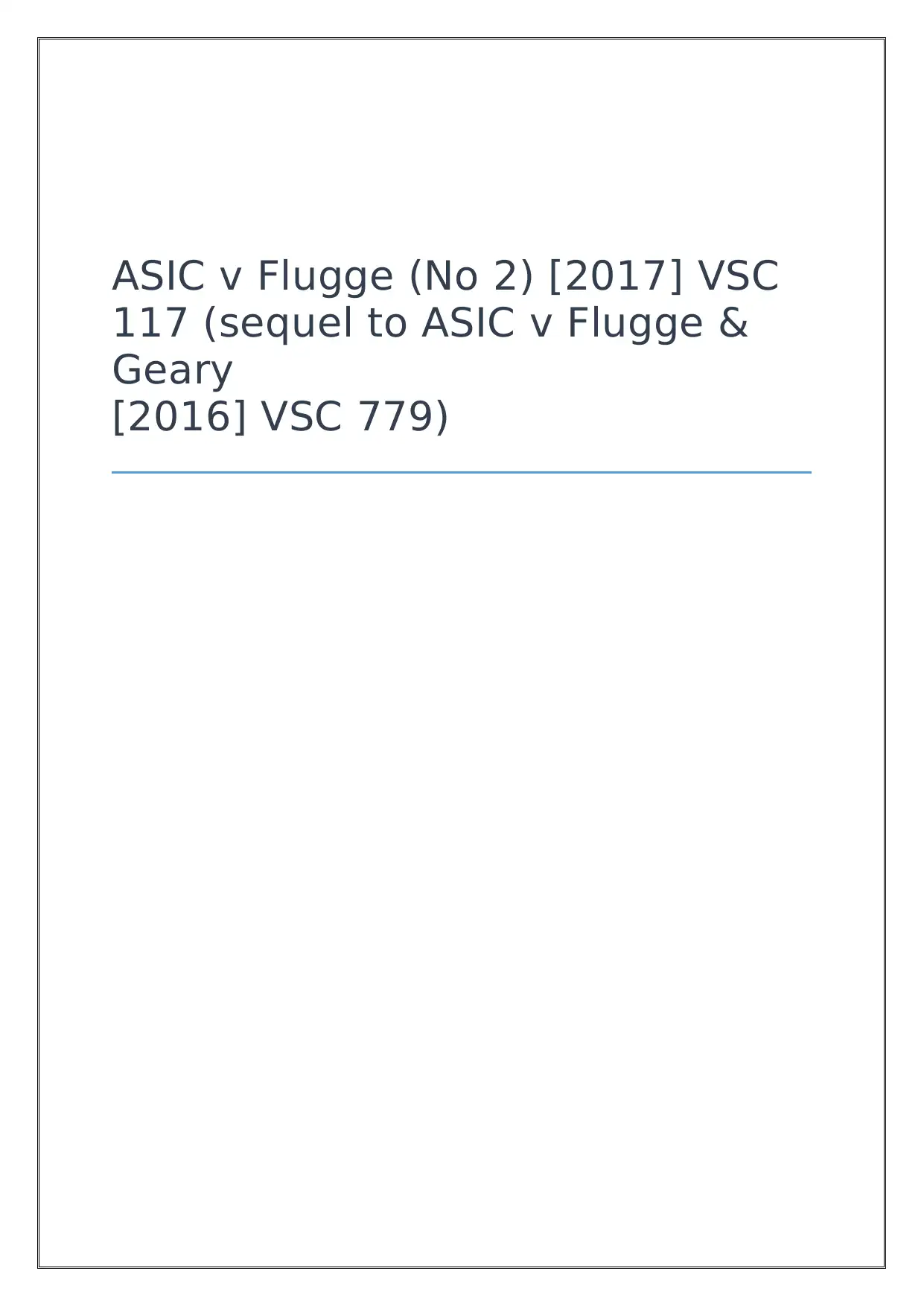
ASIC v Flugge (No 2) [2017] VSC
117 (sequel to ASIC v Flugge &
Geary
[2016] VSC 779)
117 (sequel to ASIC v Flugge &
Geary
[2016] VSC 779)
Paraphrase This Document
Need a fresh take? Get an instant paraphrase of this document with our AI Paraphraser
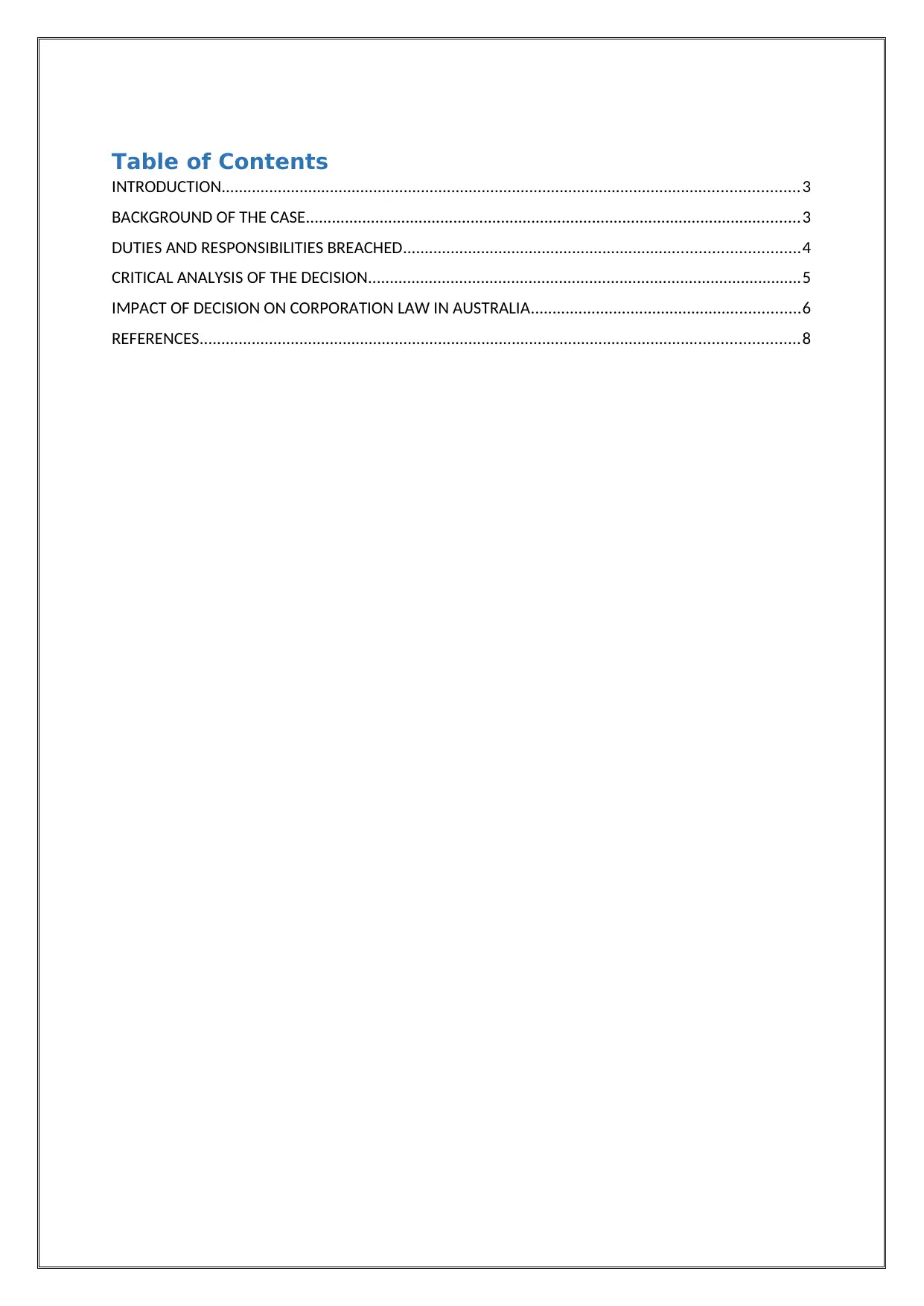
Table of Contents
INTRODUCTION.....................................................................................................................................3
BACKGROUND OF THE CASE..................................................................................................................3
DUTIES AND RESPONSIBILITIES BREACHED...........................................................................................4
CRITICAL ANALYSIS OF THE DECISION....................................................................................................5
IMPACT OF DECISION ON CORPORATION LAW IN AUSTRALIA..............................................................6
REFERENCES..........................................................................................................................................8
INTRODUCTION.....................................................................................................................................3
BACKGROUND OF THE CASE..................................................................................................................3
DUTIES AND RESPONSIBILITIES BREACHED...........................................................................................4
CRITICAL ANALYSIS OF THE DECISION....................................................................................................5
IMPACT OF DECISION ON CORPORATION LAW IN AUSTRALIA..............................................................6
REFERENCES..........................................................................................................................................8
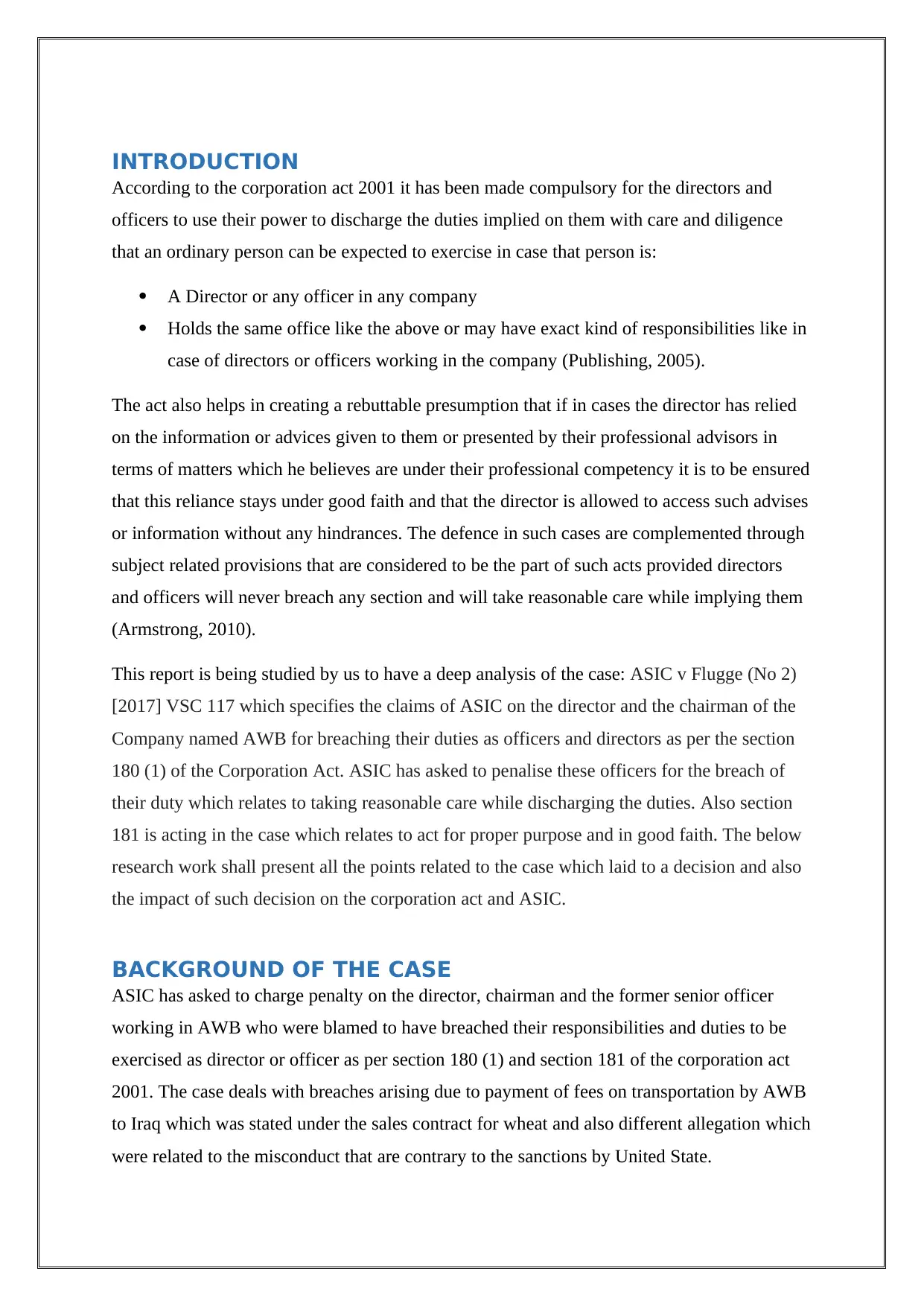
INTRODUCTION
According to the corporation act 2001 it has been made compulsory for the directors and
officers to use their power to discharge the duties implied on them with care and diligence
that an ordinary person can be expected to exercise in case that person is:
A Director or any officer in any company
Holds the same office like the above or may have exact kind of responsibilities like in
case of directors or officers working in the company (Publishing, 2005).
The act also helps in creating a rebuttable presumption that if in cases the director has relied
on the information or advices given to them or presented by their professional advisors in
terms of matters which he believes are under their professional competency it is to be ensured
that this reliance stays under good faith and that the director is allowed to access such advises
or information without any hindrances. The defence in such cases are complemented through
subject related provisions that are considered to be the part of such acts provided directors
and officers will never breach any section and will take reasonable care while implying them
(Armstrong, 2010).
This report is being studied by us to have a deep analysis of the case: ASIC v Flugge (No 2)
[2017] VSC 117 which specifies the claims of ASIC on the director and the chairman of the
Company named AWB for breaching their duties as officers and directors as per the section
180 (1) of the Corporation Act. ASIC has asked to penalise these officers for the breach of
their duty which relates to taking reasonable care while discharging the duties. Also section
181 is acting in the case which relates to act for proper purpose and in good faith. The below
research work shall present all the points related to the case which laid to a decision and also
the impact of such decision on the corporation act and ASIC.
BACKGROUND OF THE CASE
ASIC has asked to charge penalty on the director, chairman and the former senior officer
working in AWB who were blamed to have breached their responsibilities and duties to be
exercised as director or officer as per section 180 (1) and section 181 of the corporation act
2001. The case deals with breaches arising due to payment of fees on transportation by AWB
to Iraq which was stated under the sales contract for wheat and also different allegation which
were related to the misconduct that are contrary to the sanctions by United State.
According to the corporation act 2001 it has been made compulsory for the directors and
officers to use their power to discharge the duties implied on them with care and diligence
that an ordinary person can be expected to exercise in case that person is:
A Director or any officer in any company
Holds the same office like the above or may have exact kind of responsibilities like in
case of directors or officers working in the company (Publishing, 2005).
The act also helps in creating a rebuttable presumption that if in cases the director has relied
on the information or advices given to them or presented by their professional advisors in
terms of matters which he believes are under their professional competency it is to be ensured
that this reliance stays under good faith and that the director is allowed to access such advises
or information without any hindrances. The defence in such cases are complemented through
subject related provisions that are considered to be the part of such acts provided directors
and officers will never breach any section and will take reasonable care while implying them
(Armstrong, 2010).
This report is being studied by us to have a deep analysis of the case: ASIC v Flugge (No 2)
[2017] VSC 117 which specifies the claims of ASIC on the director and the chairman of the
Company named AWB for breaching their duties as officers and directors as per the section
180 (1) of the Corporation Act. ASIC has asked to penalise these officers for the breach of
their duty which relates to taking reasonable care while discharging the duties. Also section
181 is acting in the case which relates to act for proper purpose and in good faith. The below
research work shall present all the points related to the case which laid to a decision and also
the impact of such decision on the corporation act and ASIC.
BACKGROUND OF THE CASE
ASIC has asked to charge penalty on the director, chairman and the former senior officer
working in AWB who were blamed to have breached their responsibilities and duties to be
exercised as director or officer as per section 180 (1) and section 181 of the corporation act
2001. The case deals with breaches arising due to payment of fees on transportation by AWB
to Iraq which was stated under the sales contract for wheat and also different allegation which
were related to the misconduct that are contrary to the sanctions by United State.
⊘ This is a preview!⊘
Do you want full access?
Subscribe today to unlock all pages.

Trusted by 1+ million students worldwide
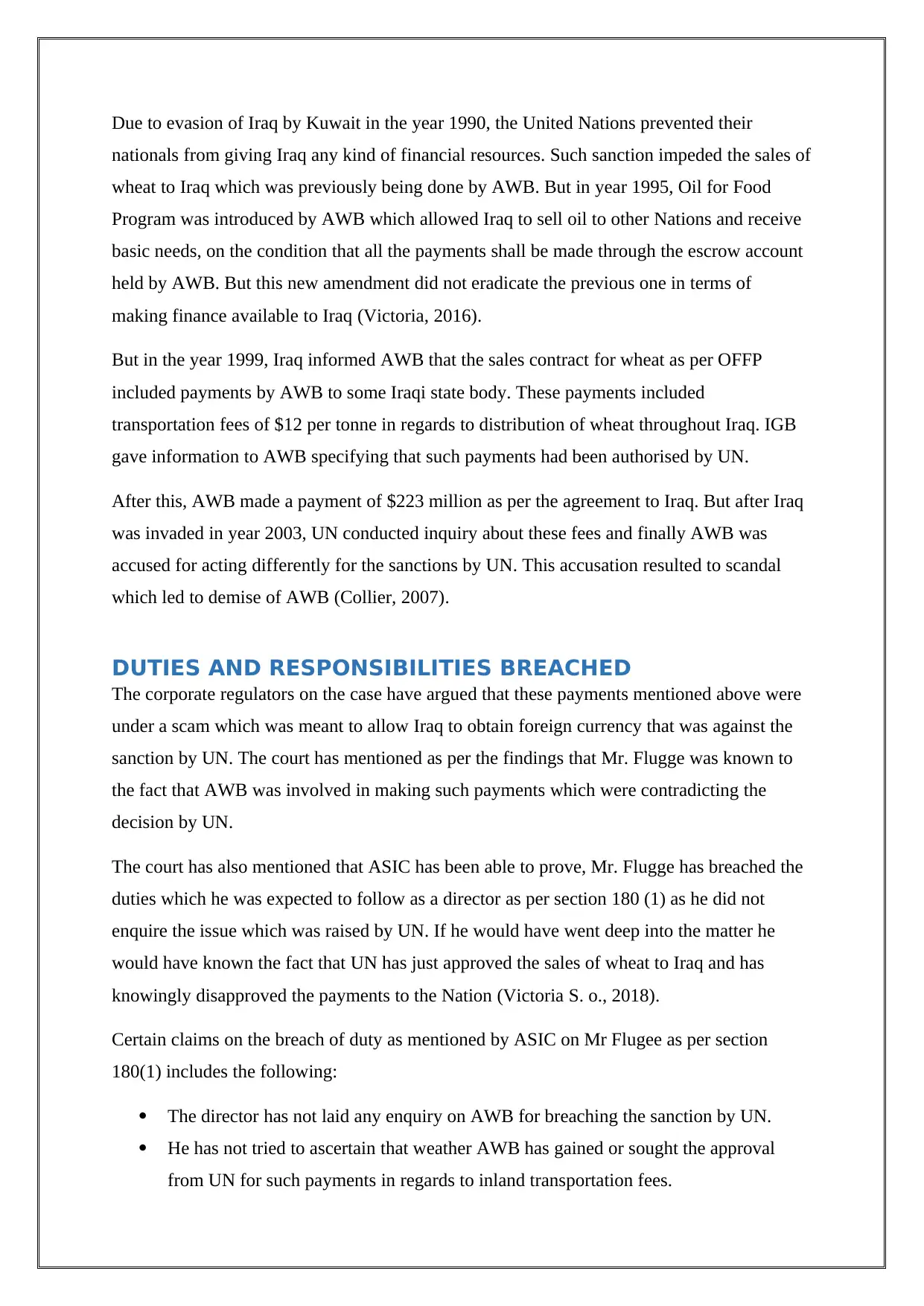
Due to evasion of Iraq by Kuwait in the year 1990, the United Nations prevented their
nationals from giving Iraq any kind of financial resources. Such sanction impeded the sales of
wheat to Iraq which was previously being done by AWB. But in year 1995, Oil for Food
Program was introduced by AWB which allowed Iraq to sell oil to other Nations and receive
basic needs, on the condition that all the payments shall be made through the escrow account
held by AWB. But this new amendment did not eradicate the previous one in terms of
making finance available to Iraq (Victoria, 2016).
But in the year 1999, Iraq informed AWB that the sales contract for wheat as per OFFP
included payments by AWB to some Iraqi state body. These payments included
transportation fees of $12 per tonne in regards to distribution of wheat throughout Iraq. IGB
gave information to AWB specifying that such payments had been authorised by UN.
After this, AWB made a payment of $223 million as per the agreement to Iraq. But after Iraq
was invaded in year 2003, UN conducted inquiry about these fees and finally AWB was
accused for acting differently for the sanctions by UN. This accusation resulted to scandal
which led to demise of AWB (Collier, 2007).
DUTIES AND RESPONSIBILITIES BREACHED
The corporate regulators on the case have argued that these payments mentioned above were
under a scam which was meant to allow Iraq to obtain foreign currency that was against the
sanction by UN. The court has mentioned as per the findings that Mr. Flugge was known to
the fact that AWB was involved in making such payments which were contradicting the
decision by UN.
The court has also mentioned that ASIC has been able to prove, Mr. Flugge has breached the
duties which he was expected to follow as a director as per section 180 (1) as he did not
enquire the issue which was raised by UN. If he would have went deep into the matter he
would have known the fact that UN has just approved the sales of wheat to Iraq and has
knowingly disapproved the payments to the Nation (Victoria S. o., 2018).
Certain claims on the breach of duty as mentioned by ASIC on Mr Flugee as per section
180(1) includes the following:
The director has not laid any enquiry on AWB for breaching the sanction by UN.
He has not tried to ascertain that weather AWB has gained or sought the approval
from UN for such payments in regards to inland transportation fees.
nationals from giving Iraq any kind of financial resources. Such sanction impeded the sales of
wheat to Iraq which was previously being done by AWB. But in year 1995, Oil for Food
Program was introduced by AWB which allowed Iraq to sell oil to other Nations and receive
basic needs, on the condition that all the payments shall be made through the escrow account
held by AWB. But this new amendment did not eradicate the previous one in terms of
making finance available to Iraq (Victoria, 2016).
But in the year 1999, Iraq informed AWB that the sales contract for wheat as per OFFP
included payments by AWB to some Iraqi state body. These payments included
transportation fees of $12 per tonne in regards to distribution of wheat throughout Iraq. IGB
gave information to AWB specifying that such payments had been authorised by UN.
After this, AWB made a payment of $223 million as per the agreement to Iraq. But after Iraq
was invaded in year 2003, UN conducted inquiry about these fees and finally AWB was
accused for acting differently for the sanctions by UN. This accusation resulted to scandal
which led to demise of AWB (Collier, 2007).
DUTIES AND RESPONSIBILITIES BREACHED
The corporate regulators on the case have argued that these payments mentioned above were
under a scam which was meant to allow Iraq to obtain foreign currency that was against the
sanction by UN. The court has mentioned as per the findings that Mr. Flugge was known to
the fact that AWB was involved in making such payments which were contradicting the
decision by UN.
The court has also mentioned that ASIC has been able to prove, Mr. Flugge has breached the
duties which he was expected to follow as a director as per section 180 (1) as he did not
enquire the issue which was raised by UN. If he would have went deep into the matter he
would have known the fact that UN has just approved the sales of wheat to Iraq and has
knowingly disapproved the payments to the Nation (Victoria S. o., 2018).
Certain claims on the breach of duty as mentioned by ASIC on Mr Flugee as per section
180(1) includes the following:
The director has not laid any enquiry on AWB for breaching the sanction by UN.
He has not tried to ascertain that weather AWB has gained or sought the approval
from UN for such payments in regards to inland transportation fees.
Paraphrase This Document
Need a fresh take? Get an instant paraphrase of this document with our AI Paraphraser
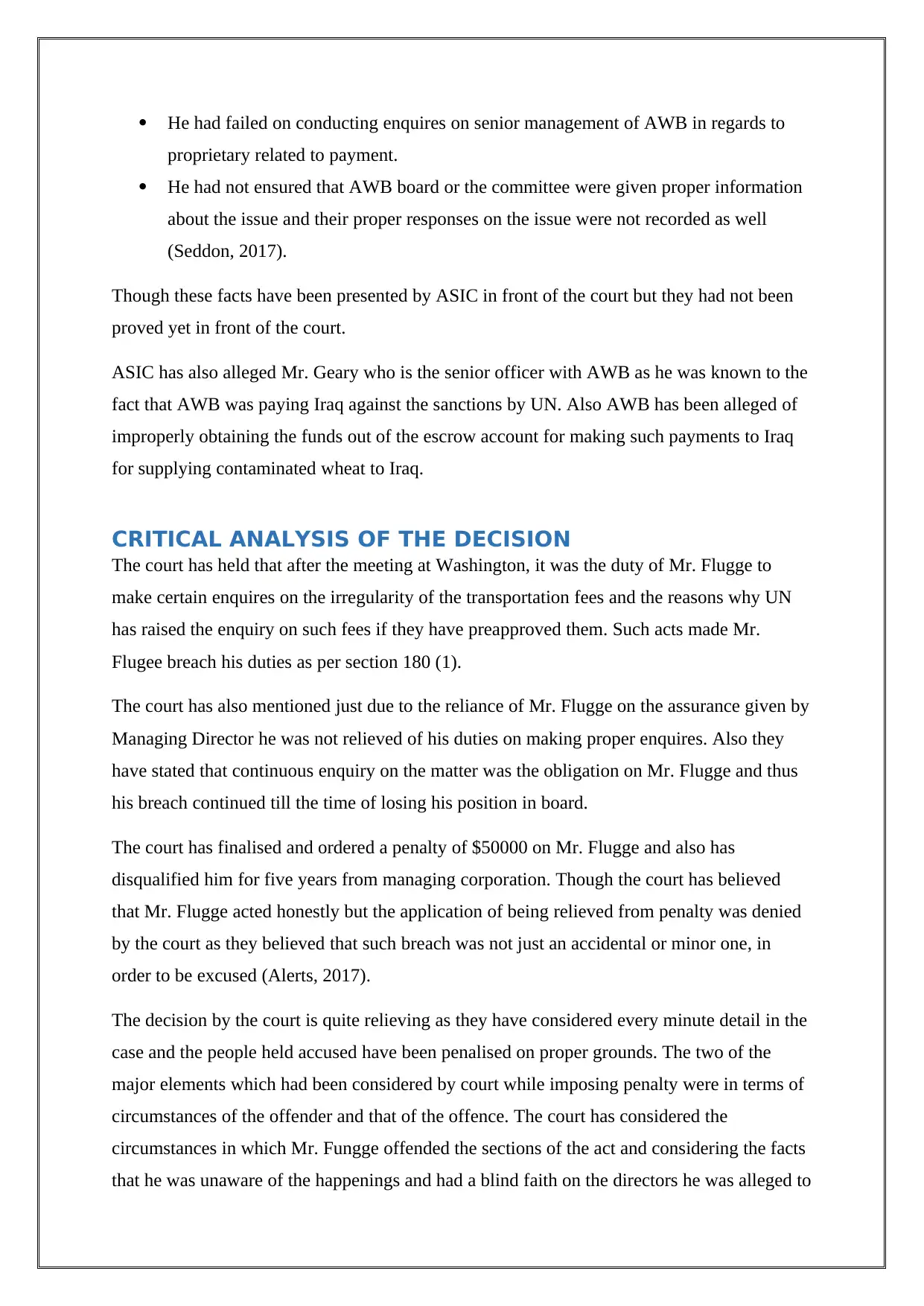
He had failed on conducting enquires on senior management of AWB in regards to
proprietary related to payment.
He had not ensured that AWB board or the committee were given proper information
about the issue and their proper responses on the issue were not recorded as well
(Seddon, 2017).
Though these facts have been presented by ASIC in front of the court but they had not been
proved yet in front of the court.
ASIC has also alleged Mr. Geary who is the senior officer with AWB as he was known to the
fact that AWB was paying Iraq against the sanctions by UN. Also AWB has been alleged of
improperly obtaining the funds out of the escrow account for making such payments to Iraq
for supplying contaminated wheat to Iraq.
CRITICAL ANALYSIS OF THE DECISION
The court has held that after the meeting at Washington, it was the duty of Mr. Flugge to
make certain enquires on the irregularity of the transportation fees and the reasons why UN
has raised the enquiry on such fees if they have preapproved them. Such acts made Mr.
Flugee breach his duties as per section 180 (1).
The court has also mentioned just due to the reliance of Mr. Flugge on the assurance given by
Managing Director he was not relieved of his duties on making proper enquires. Also they
have stated that continuous enquiry on the matter was the obligation on Mr. Flugge and thus
his breach continued till the time of losing his position in board.
The court has finalised and ordered a penalty of $50000 on Mr. Flugge and also has
disqualified him for five years from managing corporation. Though the court has believed
that Mr. Flugge acted honestly but the application of being relieved from penalty was denied
by the court as they believed that such breach was not just an accidental or minor one, in
order to be excused (Alerts, 2017).
The decision by the court is quite relieving as they have considered every minute detail in the
case and the people held accused have been penalised on proper grounds. The two of the
major elements which had been considered by court while imposing penalty were in terms of
circumstances of the offender and that of the offence. The court has considered the
circumstances in which Mr. Fungge offended the sections of the act and considering the facts
that he was unaware of the happenings and had a blind faith on the directors he was alleged to
proprietary related to payment.
He had not ensured that AWB board or the committee were given proper information
about the issue and their proper responses on the issue were not recorded as well
(Seddon, 2017).
Though these facts have been presented by ASIC in front of the court but they had not been
proved yet in front of the court.
ASIC has also alleged Mr. Geary who is the senior officer with AWB as he was known to the
fact that AWB was paying Iraq against the sanctions by UN. Also AWB has been alleged of
improperly obtaining the funds out of the escrow account for making such payments to Iraq
for supplying contaminated wheat to Iraq.
CRITICAL ANALYSIS OF THE DECISION
The court has held that after the meeting at Washington, it was the duty of Mr. Flugge to
make certain enquires on the irregularity of the transportation fees and the reasons why UN
has raised the enquiry on such fees if they have preapproved them. Such acts made Mr.
Flugee breach his duties as per section 180 (1).
The court has also mentioned just due to the reliance of Mr. Flugge on the assurance given by
Managing Director he was not relieved of his duties on making proper enquires. Also they
have stated that continuous enquiry on the matter was the obligation on Mr. Flugge and thus
his breach continued till the time of losing his position in board.
The court has finalised and ordered a penalty of $50000 on Mr. Flugge and also has
disqualified him for five years from managing corporation. Though the court has believed
that Mr. Flugge acted honestly but the application of being relieved from penalty was denied
by the court as they believed that such breach was not just an accidental or minor one, in
order to be excused (Alerts, 2017).
The decision by the court is quite relieving as they have considered every minute detail in the
case and the people held accused have been penalised on proper grounds. The two of the
major elements which had been considered by court while imposing penalty were in terms of
circumstances of the offender and that of the offence. The court has considered the
circumstances in which Mr. Fungge offended the sections of the act and considering the facts
that he was unaware of the happenings and had a blind faith on the directors he was alleged to
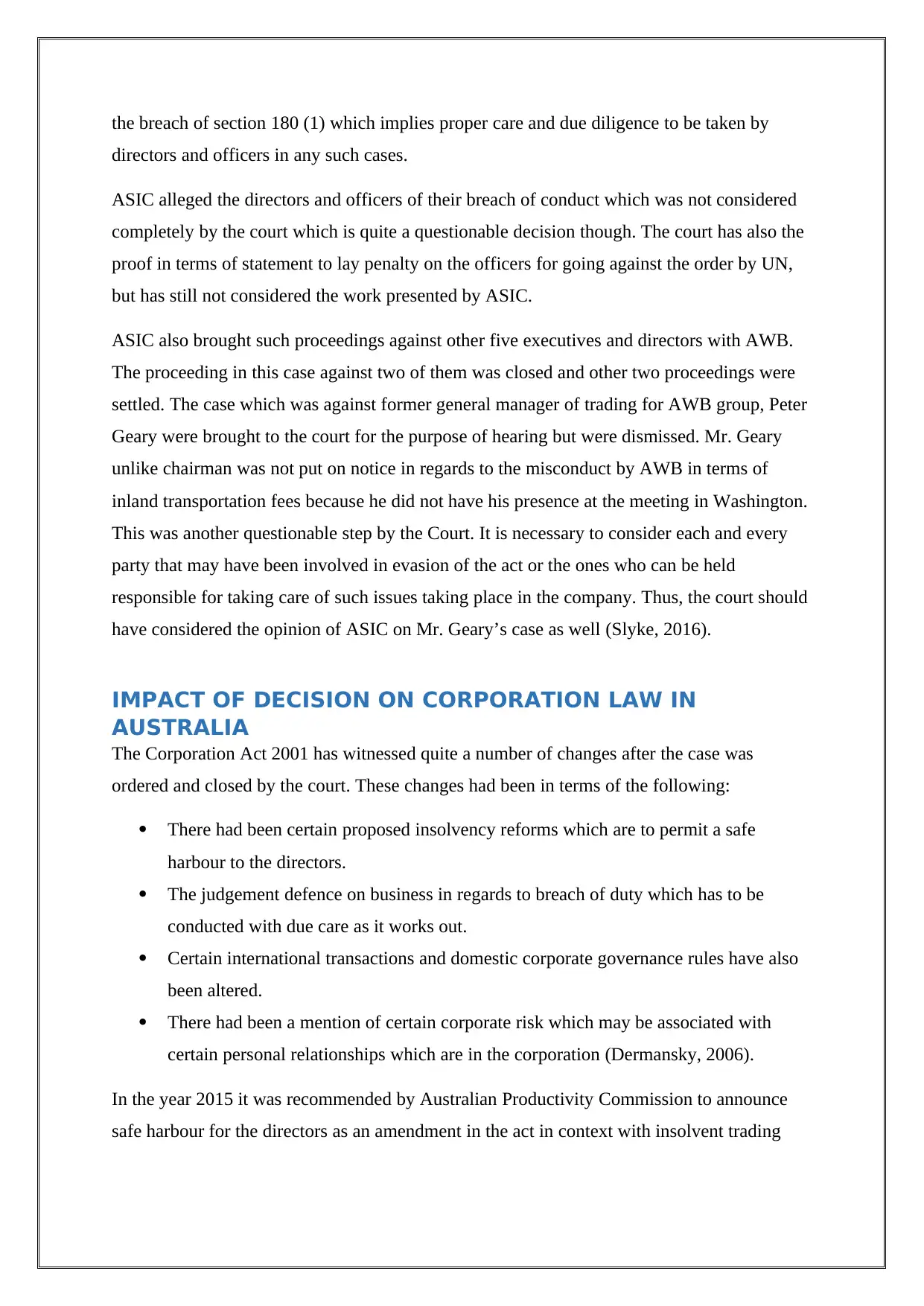
the breach of section 180 (1) which implies proper care and due diligence to be taken by
directors and officers in any such cases.
ASIC alleged the directors and officers of their breach of conduct which was not considered
completely by the court which is quite a questionable decision though. The court has also the
proof in terms of statement to lay penalty on the officers for going against the order by UN,
but has still not considered the work presented by ASIC.
ASIC also brought such proceedings against other five executives and directors with AWB.
The proceeding in this case against two of them was closed and other two proceedings were
settled. The case which was against former general manager of trading for AWB group, Peter
Geary were brought to the court for the purpose of hearing but were dismissed. Mr. Geary
unlike chairman was not put on notice in regards to the misconduct by AWB in terms of
inland transportation fees because he did not have his presence at the meeting in Washington.
This was another questionable step by the Court. It is necessary to consider each and every
party that may have been involved in evasion of the act or the ones who can be held
responsible for taking care of such issues taking place in the company. Thus, the court should
have considered the opinion of ASIC on Mr. Geary’s case as well (Slyke, 2016).
IMPACT OF DECISION ON CORPORATION LAW IN
AUSTRALIA
The Corporation Act 2001 has witnessed quite a number of changes after the case was
ordered and closed by the court. These changes had been in terms of the following:
There had been certain proposed insolvency reforms which are to permit a safe
harbour to the directors.
The judgement defence on business in regards to breach of duty which has to be
conducted with due care as it works out.
Certain international transactions and domestic corporate governance rules have also
been altered.
There had been a mention of certain corporate risk which may be associated with
certain personal relationships which are in the corporation (Dermansky, 2006).
In the year 2015 it was recommended by Australian Productivity Commission to announce
safe harbour for the directors as an amendment in the act in context with insolvent trading
directors and officers in any such cases.
ASIC alleged the directors and officers of their breach of conduct which was not considered
completely by the court which is quite a questionable decision though. The court has also the
proof in terms of statement to lay penalty on the officers for going against the order by UN,
but has still not considered the work presented by ASIC.
ASIC also brought such proceedings against other five executives and directors with AWB.
The proceeding in this case against two of them was closed and other two proceedings were
settled. The case which was against former general manager of trading for AWB group, Peter
Geary were brought to the court for the purpose of hearing but were dismissed. Mr. Geary
unlike chairman was not put on notice in regards to the misconduct by AWB in terms of
inland transportation fees because he did not have his presence at the meeting in Washington.
This was another questionable step by the Court. It is necessary to consider each and every
party that may have been involved in evasion of the act or the ones who can be held
responsible for taking care of such issues taking place in the company. Thus, the court should
have considered the opinion of ASIC on Mr. Geary’s case as well (Slyke, 2016).
IMPACT OF DECISION ON CORPORATION LAW IN
AUSTRALIA
The Corporation Act 2001 has witnessed quite a number of changes after the case was
ordered and closed by the court. These changes had been in terms of the following:
There had been certain proposed insolvency reforms which are to permit a safe
harbour to the directors.
The judgement defence on business in regards to breach of duty which has to be
conducted with due care as it works out.
Certain international transactions and domestic corporate governance rules have also
been altered.
There had been a mention of certain corporate risk which may be associated with
certain personal relationships which are in the corporation (Dermansky, 2006).
In the year 2015 it was recommended by Australian Productivity Commission to announce
safe harbour for the directors as an amendment in the act in context with insolvent trading
⊘ This is a preview!⊘
Do you want full access?
Subscribe today to unlock all pages.

Trusted by 1+ million students worldwide
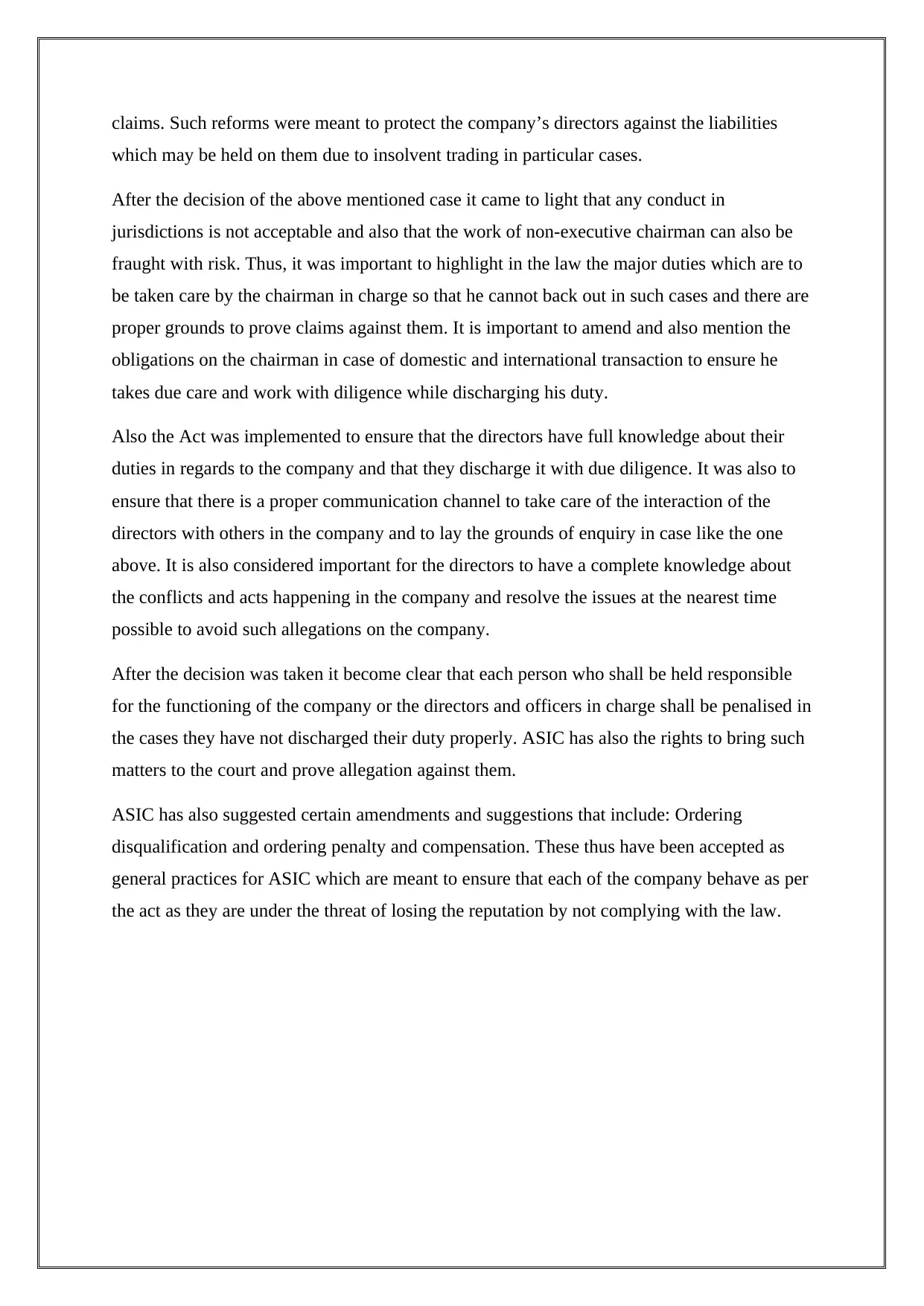
claims. Such reforms were meant to protect the company’s directors against the liabilities
which may be held on them due to insolvent trading in particular cases.
After the decision of the above mentioned case it came to light that any conduct in
jurisdictions is not acceptable and also that the work of non-executive chairman can also be
fraught with risk. Thus, it was important to highlight in the law the major duties which are to
be taken care by the chairman in charge so that he cannot back out in such cases and there are
proper grounds to prove claims against them. It is important to amend and also mention the
obligations on the chairman in case of domestic and international transaction to ensure he
takes due care and work with diligence while discharging his duty.
Also the Act was implemented to ensure that the directors have full knowledge about their
duties in regards to the company and that they discharge it with due diligence. It was also to
ensure that there is a proper communication channel to take care of the interaction of the
directors with others in the company and to lay the grounds of enquiry in case like the one
above. It is also considered important for the directors to have a complete knowledge about
the conflicts and acts happening in the company and resolve the issues at the nearest time
possible to avoid such allegations on the company.
After the decision was taken it become clear that each person who shall be held responsible
for the functioning of the company or the directors and officers in charge shall be penalised in
the cases they have not discharged their duty properly. ASIC has also the rights to bring such
matters to the court and prove allegation against them.
ASIC has also suggested certain amendments and suggestions that include: Ordering
disqualification and ordering penalty and compensation. These thus have been accepted as
general practices for ASIC which are meant to ensure that each of the company behave as per
the act as they are under the threat of losing the reputation by not complying with the law.
which may be held on them due to insolvent trading in particular cases.
After the decision of the above mentioned case it came to light that any conduct in
jurisdictions is not acceptable and also that the work of non-executive chairman can also be
fraught with risk. Thus, it was important to highlight in the law the major duties which are to
be taken care by the chairman in charge so that he cannot back out in such cases and there are
proper grounds to prove claims against them. It is important to amend and also mention the
obligations on the chairman in case of domestic and international transaction to ensure he
takes due care and work with diligence while discharging his duty.
Also the Act was implemented to ensure that the directors have full knowledge about their
duties in regards to the company and that they discharge it with due diligence. It was also to
ensure that there is a proper communication channel to take care of the interaction of the
directors with others in the company and to lay the grounds of enquiry in case like the one
above. It is also considered important for the directors to have a complete knowledge about
the conflicts and acts happening in the company and resolve the issues at the nearest time
possible to avoid such allegations on the company.
After the decision was taken it become clear that each person who shall be held responsible
for the functioning of the company or the directors and officers in charge shall be penalised in
the cases they have not discharged their duty properly. ASIC has also the rights to bring such
matters to the court and prove allegation against them.
ASIC has also suggested certain amendments and suggestions that include: Ordering
disqualification and ordering penalty and compensation. These thus have been accepted as
general practices for ASIC which are meant to ensure that each of the company behave as per
the act as they are under the threat of losing the reputation by not complying with the law.
Paraphrase This Document
Need a fresh take? Get an instant paraphrase of this document with our AI Paraphraser
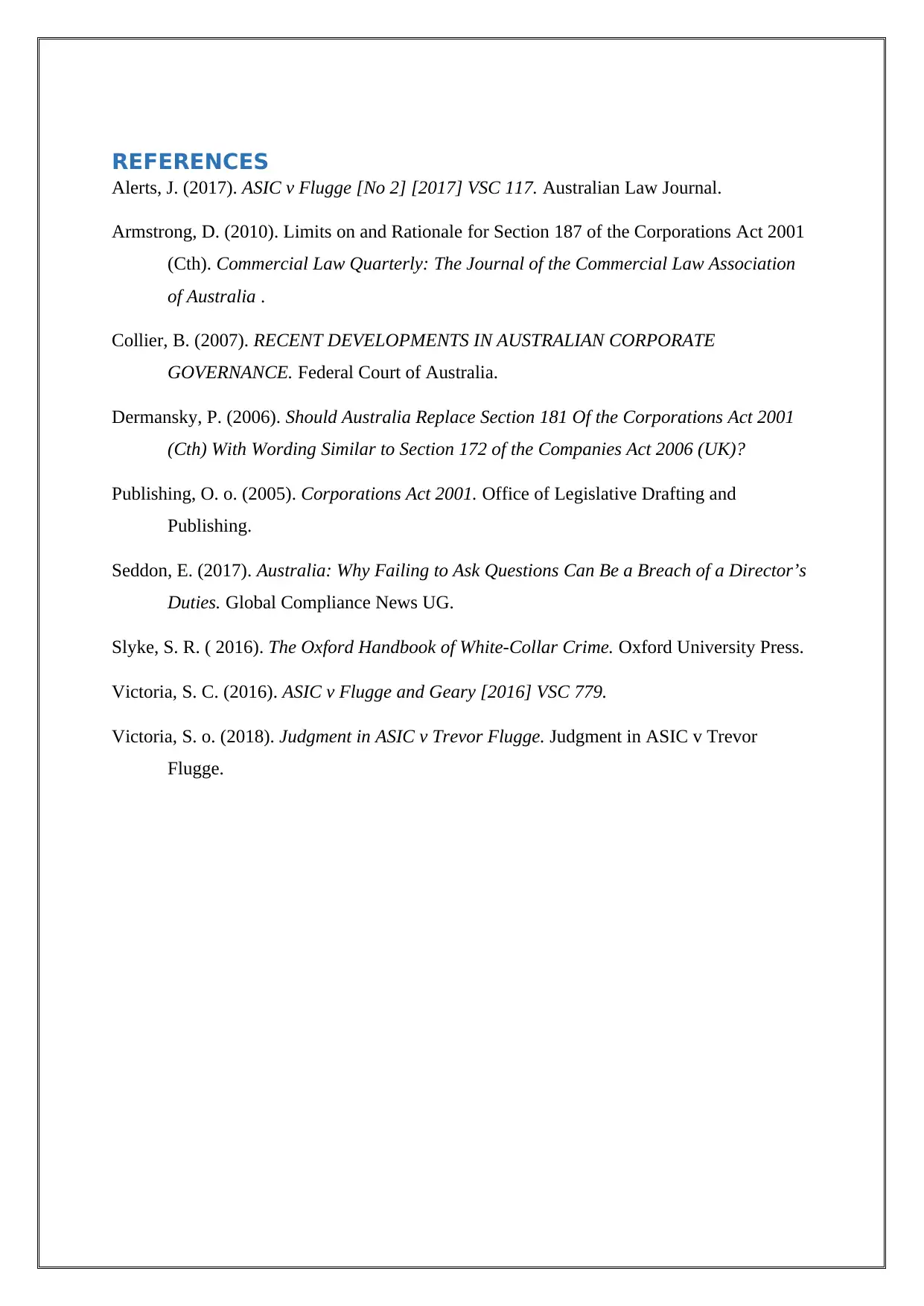
REFERENCES
Alerts, J. (2017). ASIC v Flugge [No 2] [2017] VSC 117. Australian Law Journal.
Armstrong, D. (2010). Limits on and Rationale for Section 187 of the Corporations Act 2001
(Cth). Commercial Law Quarterly: The Journal of the Commercial Law Association
of Australia .
Collier, B. (2007). RECENT DEVELOPMENTS IN AUSTRALIAN CORPORATE
GOVERNANCE. Federal Court of Australia.
Dermansky, P. (2006). Should Australia Replace Section 181 Of the Corporations Act 2001
(Cth) With Wording Similar to Section 172 of the Companies Act 2006 (UK)?
Publishing, O. o. (2005). Corporations Act 2001. Office of Legislative Drafting and
Publishing.
Seddon, E. (2017). Australia: Why Failing to Ask Questions Can Be a Breach of a Director’s
Duties. Global Compliance News UG.
Slyke, S. R. ( 2016). The Oxford Handbook of White-Collar Crime. Oxford University Press.
Victoria, S. C. (2016). ASIC v Flugge and Geary [2016] VSC 779.
Victoria, S. o. (2018). Judgment in ASIC v Trevor Flugge. Judgment in ASIC v Trevor
Flugge.
Alerts, J. (2017). ASIC v Flugge [No 2] [2017] VSC 117. Australian Law Journal.
Armstrong, D. (2010). Limits on and Rationale for Section 187 of the Corporations Act 2001
(Cth). Commercial Law Quarterly: The Journal of the Commercial Law Association
of Australia .
Collier, B. (2007). RECENT DEVELOPMENTS IN AUSTRALIAN CORPORATE
GOVERNANCE. Federal Court of Australia.
Dermansky, P. (2006). Should Australia Replace Section 181 Of the Corporations Act 2001
(Cth) With Wording Similar to Section 172 of the Companies Act 2006 (UK)?
Publishing, O. o. (2005). Corporations Act 2001. Office of Legislative Drafting and
Publishing.
Seddon, E. (2017). Australia: Why Failing to Ask Questions Can Be a Breach of a Director’s
Duties. Global Compliance News UG.
Slyke, S. R. ( 2016). The Oxford Handbook of White-Collar Crime. Oxford University Press.
Victoria, S. C. (2016). ASIC v Flugge and Geary [2016] VSC 779.
Victoria, S. o. (2018). Judgment in ASIC v Trevor Flugge. Judgment in ASIC v Trevor
Flugge.
1 out of 8
Related Documents
Your All-in-One AI-Powered Toolkit for Academic Success.
+13062052269
info@desklib.com
Available 24*7 on WhatsApp / Email
![[object Object]](/_next/static/media/star-bottom.7253800d.svg)
Unlock your academic potential
Copyright © 2020–2026 A2Z Services. All Rights Reserved. Developed and managed by ZUCOL.


![In-depth Case Study of ASIC v Flugge & Geary [2016] VSC 779 Law](/_next/image/?url=https%3A%2F%2Fdesklib.com%2Fmedia%2Fdocument%2Fpages%2F2024-07-29%2Fasic-v-flugge-geary-2016-vsc-779-a-case-study-on-directors-duties-page-2.webp&w=256&q=75)


